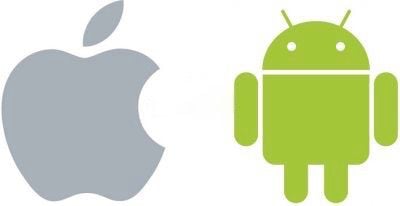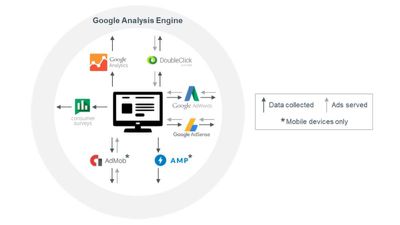Idle Android devices typically send data ten times more often to Google than iOS devices do to Apple's servers, according to new research shared by trade association Digital Content Next.
In a paper titled "Google Data Collection," Douglas C. Schmidt, a computer science professor at Vanderbilt University, arrives at some stark conclusions regarding how much Google is collecting about consumers who use the company's products, even when they aren't interacting with their smartphones and tablets.
Among several findings, Schmidt's experiments found that an idle Android phone with Chrome web browser active in the background communicated location information to Google 340 times during a 24-hour period. An equivalent experiment found that on an iOS device with Safari open but not Chrome, Google could not collect any appreciable data unless a user was interacting with the device.

In addition, he found that an idle Android phone running Chrome sends back to Google nearly fifty times as many data requests per hour as an idle iPhone running Safari. Overall, an idle Android device was found to communicate with Google nearly 10 times more often than an Apple device communicates with Apple servers.
As well as data transmission frequencies, Schmidt's research also turned up some of the ways that Google can potentially tie together anonymous data collected through passive means with the personal information of its users.
For example, on an Android device, so-called "anonymous" advertising identifiers that collect activity data on apps and third-party web page visits can get associated with a user's real Google identity by the passing of device-level identification information to Google servers.
The same goes for the supposedly user-anonymous DoubleClick cookie ID, which tracks a user's activity on third-party web pages. According to Schmidt's research, Google can associate the cookie to a user's Google account when a user accesses a Google app in the same browser that a third-party web page was accessed.
The research follows a recent investigation conducted by the Associated Press which revealed that Google continues to track location data even after a consumer has turned off the setting in many of its apps, including Google Maps.

In response to a query about location history tracking, Google said that it is clear about its location policies, yet the company continues to collect data through app features that come under "My Activity" even when its "Location History" setting is turned off. The practice has since led to a class action lawsuit against the company by a user arguing breach of privacy.
Location information stored in "My Activity" is used for ad targeting purposes, which is still Google's primary business model. In contrast, Apple uses differential privacy to gather anonymous usage insights from devices like iPhones, iPads, and Macs, allowing it to crowdsource data from a large number of users without compromising the privacy of any individual.
Apple says the data it collects off-device is used to improve services like Siri suggestions, and to help identify problematic websites that use excessive power or too much memory in Safari, but the data is randomized before being sent from devices, so that its servers never see or receive raw data from users.
When users set up their device, Apple explicitly asks users if they wish to provide usage information on an opt-in basis. If a user declines, no data is collected by Apple unless they choose to opt in at a later time.
Apple executives have said several times that Apple customers are not the company's product, and Apple CEO Tim Cook has maintained that privacy is a fundamental human right. The company also has a dedicated privacy website that explains its approach to privacy, outlines tools available to customers to protect their privacy, and details government data requests.






















